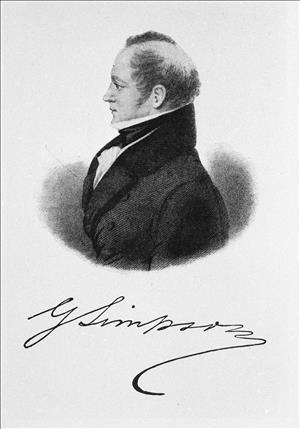On October 28, 1824, George Simpson (ca. 1787-1860), a Hudson's Bay Company official, arrives at the company's Spokane House fur-trading post (located not far from where the city of Spokane will later grow up) after journeying across the continent by canoe. Simpson has been involved with the New World fur trade for only four years, having spent his earlier career with a sugar brokerage firm in London, where he became known for a "clear-headed business outlook and bargaining ability" (Galbraith, 812). He now oversees the Hudson's Bay Company's fur-trading operations west of the Continental Divide in present-day Washington, Oregon, Idaho, Montana, and British Columbia. The company's directors are concerned about the region's profitability and have instructed Simpson to assess the situation.
Simpson Explores the Territory
Three years earlier, in 1821, the Hudson's Bay Company, a fur-trading enterprise headquartered in London, had merged with its chief rival, the Montreal-based North West Company. The coalition, operating under the Hudson's Bay Company name, appointed Simpson, a 35-year-old Scot, as governor over the Northern Department, a vast territory extending from Hudson Bay to the Pacific. The trade west of the Rockies was organized into the New Caledonia Department (the Fraser River drainage) and the Columbia Department (the Columbia River drainage).
Known for his tireless energy, the governor embarked on a tour of his western domain in the summer of 1824. He departed from York Factory on Hudson Bay on August 15 and sped across the continent by canoe, setting records along the way. By October 27, he had reached the mouth of the Spokane River (where it joins the Columbia), where he met Peter Skene Ogden (1790-1854) and John Work (ca. 1792-1861), veterans of the Northwest fur trade. Because the Spokane was not navigable for canoes, they made the 60-mile trek from the Columbia upriver to Spokane House on horseback. In his journal, Simpson noted, "the road tolerably good and the Country interesting being a succession of Hills plains and points of Wood the winding course of the River bringing it frequently to our view and adding much to the beauty of the scenery" (Simpson, 43).
Spokane House had been built by Jacques Raphael ("Jaco") Finlay (1768-1828), a North West Company clerk and scout who helped geographer and fur agent David Thompson (1770-1857) introduce the fur trade to Inland Northwest tribes. In the summer of 1810, Finlay chose a point of land at the junction of the Spokane and Little Spokane rivers, near a sizeable Spokane Indian village (and about 10 miles downstream from where the city of Spokane would later be developed), for the fur post.
Stop "Eating Gold" and Find Your Own Food
Simpson deemed the trade house "delightfully situated ... in a fine plain or valley and surrounded at the distance of two or three miles by Hills clothed with Grass and fine Timber to their summits" (Simpson, 44). He was less delighted with the financial accounts he perused during his stay. His frugal nature was particularly distressed at the large quantity of provisions being imported from England, such as corn, peas, salt pork, and flour. He chided past and present managers for neglecting to compute the costs: "if they had taken that trouble they would have had little difficulty in discovering that all this time they may be said to have been eating Gold" (Simpson, 47).
He also gave notice that this practice was about to change. "I have therefore given intimation that they had better Hoard the European provisions and Luxuries they have got now in Store as their future supplies will be very scanty" (Simpson, 48). He had a solution to the problem close at hand: "they have abundance of the finest Salmon in the World besides a variety of other Fish within 100 yards of their Door, plenty of Potatoes, Game if they like it, in short every thing that is good or necessary for an Indian trader" (Simpson, 48). The governor promised to send a supply of garden seeds with the next canoe brigade so the residents might raise vegetables to complement their diet.
Several Spokane and Nez Perces groups were camped near the house, and Simpson invited their headmen to the trading hall for a speech that probably included exhortations to deliver greater numbers of furs to the company's posts. His words were accompanied by "the usual formalities," the custom of smoking a pipe as a symbol of peaceful relations (Simpson, 47).
After spending two days examining ledgers and reassigning personnel, the governor rode back to the mouth of the Spokane and resumed his journey down the Columbia to the Fort George trading post at the mouth of the river.

